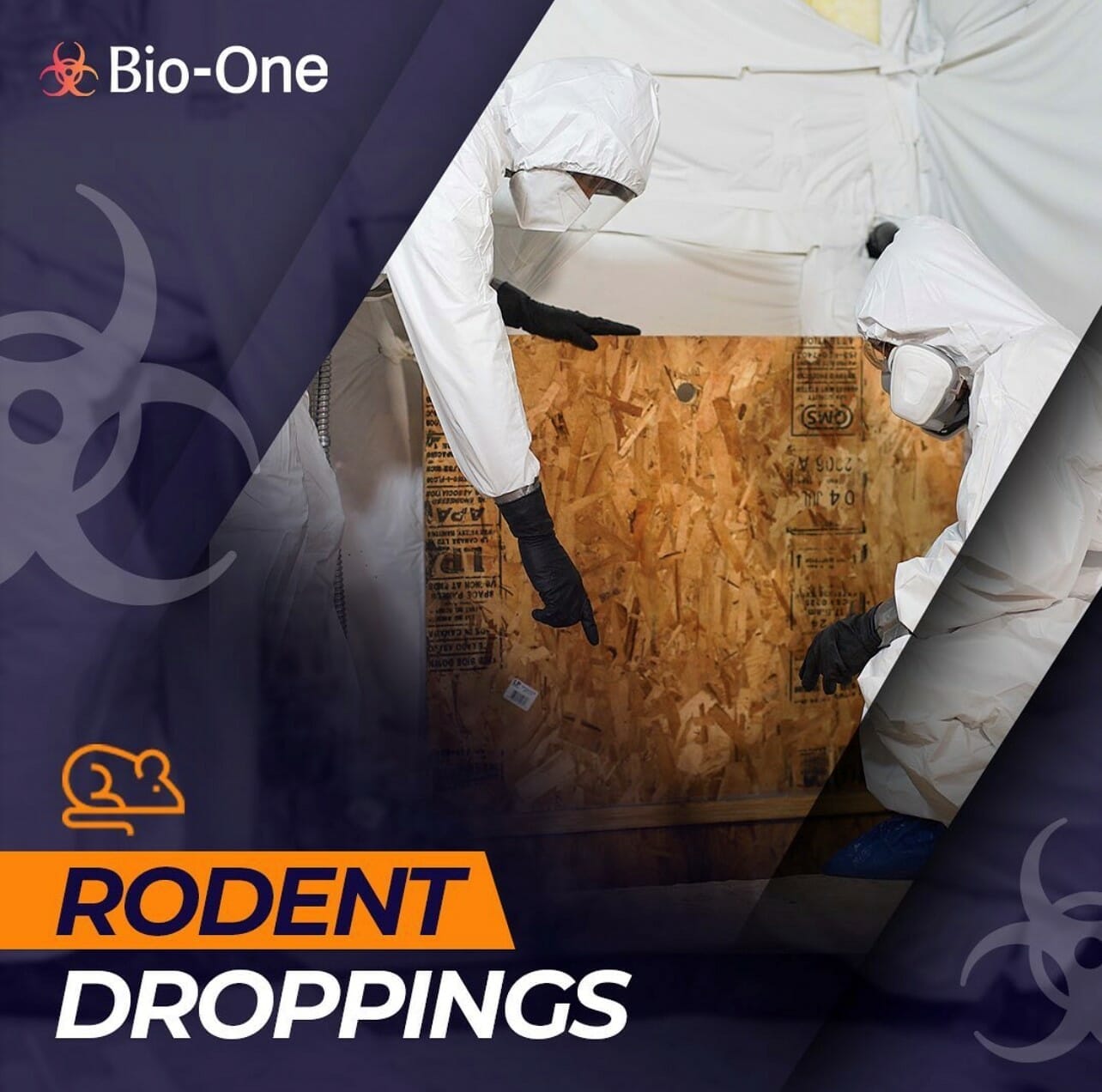
Maintaining a clean and sanitary environment is crucial for our overall health and well-being. One often overlooked aspect of hygiene is the proper disinfection of rodent droppings. While rodents may seem harmless, their droppings can pose serious health risks. This blog will explore the importance of rodent droppings disinfection and understand why it is essential for safeguarding public health. Bio-One Scottsdale specializes in Rodent Disinfection for residential and commercial properties to keep you and your loved ones safe.
Health Risks Associated with Rodent Droppings
Rodents, such as mice and rats, are known carriers of various diseases and pathogens. Their droppings can harbor harmful bacteria, viruses, and parasites that can contaminate surfaces, food, and air, leading to the transmission of diseases to humans. Disinfection of rodent droppings is especially important to certain people at risk. These groups include people who are pregnant, elderly, immunocompromised, and infants and toddlers. Some of the health risks that the Center for Disease Control (CDC) mentions, associated with rodent droppings include:
- Hantavirus: Hantavirus Pulmonary Syndrome (HPS) is a severe respiratory illness transmitted through contact with infected rodent droppings. Inhaling dust contaminated with Hantavirus can lead to flu-like symptoms and, in some cases, can be fatal.
- Salmonellosis: Rodent droppings can be a source of Salmonella bacteria, causing gastrointestinal illness. Ingesting food or water contaminated with rodent feces can result in symptoms like diarrhea, abdominal pain, and fever.
- Leptospirosis: Leptospirosis is a bacterial infection transmitted through contact with water, soil, or food contaminated with urine from infected rodents. It can lead to fever, headache, muscle aches, and, in severe cases, liver or kidney damage.
- Plague: Though rare, rodent droppings can carry Yersinia pestis, the bacteria responsible for the bubonic plague. Fleas that infest rodents can transmit the disease to humans, causing severe illness if left untreated.
Importance of Rodent Droppings Disinfection
- Prevention of Disease Transmission: Properly disinfecting rodent droppings can help eliminate or reduce the risk of disease transmission. By removing the bacteria, viruses, and parasites present in the droppings, we can effectively protect ourselves and our communities from potential health hazards.
- Mitigating Allergens: Rodent droppings can trigger allergic reactions in susceptible individuals. The proteins present in the droppings can cause respiratory distress, especially in those with pre-existing respiratory conditions such as asthma. Disinfecting the area helps remove these allergens and promotes a healthier living environment.
- Eliminating Attractants: Rodent droppings are a clear sign of infestation. By promptly disinfecting the affected area, we can remove the scent and pheromones left behind, reducing the likelihood of attracting more rodents. This proactive approach helps in preventing further infestations and keeps our surroundings rodent-free.
- Restoring Peace of Mind: Living or working in an environment contaminated with rodent droppings can be distressing and mentally taxing. Proper disinfection removes the physical remnants and restores a sense of cleanliness and peace of mind.
Best Practices for Rodent Droppings Disinfection
When dealing with rodent droppings, it is essential to follow proper guidelines to ensure effective disinfection:
- Safety First: Wear protective gloves, a mask, and goggles to avoid direct contact with the droppings and prevent inhalation of airborne particles.
- Cleaning: Begin by carefully removing any visible droppings using disposable paper towels or a damp cloth. Double-bag the waste in plastic bags for disposal.
- Disinfection: Use a recommended disinfectant that is effective against a wide range of pathogens. Thoroughly clean the affected area, including surfaces, floors, and objects, following the instructions provided by the disinfectant manufacturer.
- Ventilation: During and after disinfection, ensure proper ventilation by opening windows or using fans to allow fresh air to circulate and remove any residual odors or disinfectant fumes.
- Preventive Measures: Identify and address any potential entry points or conditions that may attract rodents to prevent future infestations. Seal cracks, store food properly, and maintain cleanliness in and around your living or working spaces.
Rodent Urine is also dangerous
Rodent urine can also pose significant health risks and should be treated with caution. When rodents, such as rats or mice, urinate, they can contaminate surfaces and objects with bacteria, viruses, and other pathogens present in their urine. Rodent urine is more dangerous than droppings due to it being harder to detect whether it's on the wall, floor, or on objects. Regular cleaning and disinfection, along with proper rodent control measures, are essential for maintaining a healthy and safe environment.
How Bio-One Scottsdale can help
Disinfecting rodent droppings is not just about cleanliness; it is a critical step in protecting ourselves and our communities from potential health risks. By promptly addressing rodent infestations and following proper disinfection protocols, we can mitigate the spread of diseases and ensure a safer, healthier environment for everyone. Let Bio-One Scottsdale prioritize rodent droppings disinfection for you to keep you and your loved ones safe.
If you have any questions, you can reach out to us at any time. We are always here to help.
"Help First, Business Second"
24 / 7 / 365
(480) 276-4061


